- Home
- Patricia Highsmith
Found in the Street
Found in the Street Read online
FOUND IN THE STREET
Patricia Highsmith
First published by
William Heinemann Ltd.
1986
Patricia Highsmith defies categorization. American by birth but long an exile, she has written twenty-five books and become a best-seller throughout Europe. Yet since her first novel, Strangers on a Train, published in 1950 and the basis for Hitchcock’s famous film, she has been regarded more as a mystery writer than as someone deserving of a place (close to Poe or Hammett) in her native literary tradition. Her books, as Brigid Brophy has written, “are thrillers chiefly in the sense that every good novel is.”
Set in Greenwich Village, Found in the Street is a powerful novel of sexual obsession and the complexity of desire. Elsie Taylor is one of the youthful thousands who drift into New York City every year looking for good times and opportunities. She has vitality, innocence, ambition, and a beauty that attracts men and women alike. But to Ralph Linderman—a failed inventor who walks the streets at dawn with a dog named God—she seems oblivious to, and endangered by, the corruption he sees everywhere around him.
Waitressing as she dreams of greater things, Elsie is soon taken up by an older, sophisticated circle won over by her unstudied charms. Jack Sutherland, an illustrator, comes to adore her with an artists eye, but it is his wife, Natalia, who is most smitten. But as Elsie’s future grows ever more promising and complicated, Ralph becomes even more agitated and persistent. And in the end, no one’s emotions are as simple as they might seem, as everyone must reconsider what they loved—or loathed—about this remarkable young woman.
“A writer who has created a world of her own—a world claustrophobic and irrational which we enter each time with a sense of personal danger…It is not the world as we once believed we knew it, but it is frighteningly more real to us than the house next door.”
—GRAHAM GREENE
“Highsmith’s books have their origin in some sensational idea, but it is not the ideas behind her books so much as the intensity and skill with which they are presented that make her such a rewarding novelist.”
—JULIAN SYMONS
“Fabulous, in all senses of that word…combining the best features of the suspense genre with the best of existential fiction—a thrilled reflection.”
—PAUL THEROUX
For Kingsley
1
The girl trotted, and leapt to a curb. She wore new sneakers, spotlessly white, black corduroy trousers, and a white T-shirt with a red apple design on its front. Dodging pedestrians, she swerved and disappeared into a shop whose window displayed lavender-colored items, scarves of shocking pink, beads, and was out within seconds, moving on, tempted by the other side of the street, but staying on the side where she was. Like a butterfly, she described a half-circle to avoid a shuffling clump of people, then hovered before another shop whose wares extended onto the sidewalk. Not this one either.
The white sneakers flitted on, the short yellow hair bobbed. She moved toward a spot of red, lingered, and entered. The West Fourth Street shoppers drifted in both directions on the sidewalk. It was nearly 6 in the afternoon of a late August day, and the air was cool and sunny. The blond girl emerged with a beige plastic bag in one hand. Her other hand shoved a small billfold into a back pocket of her corduroys. Her smile was wider on her unrouged lips, a happy smile with a hint of mischief in it.
She paused to let a car go by, heels together as she rose impatiently on her toes. A young black passed in front of her, made as if to tweak her breast, and she drew back, upperlip curling to reveal a pointed eyetooth. On again she went, lips parted for air, eyes searching for gaps to run through.
Several yards in front of her, beyond dumpy women and boys in blue jeans, she spotted a male figure with a rather side to side gait and with a dog on a leash. The girl stopped abruptly, and took the first opportunity to cross the street.
God’s lifting his leg and all’s right with the world, Ralph Linderman was thinking as he approached the corner where Grove Street crossed Bleecker.
It was a lovely summer day, the low sun still poured from the west through certain of the crooked Village streets, and Grove Street looked prettier than usual to Ralph. Grove Street like Barrow and Commerce Streets was neat and tidy, and Ralph appreciated that. People polished their door-knockers and kept their front steps swept. Now Morton Street, just three streets southward, was a mess, scraps of paper in the gutter, ashcans in plain view at the curb. Ralph realized that he usually saw the uglier side of things and people too, but he considered this simply realistic, even wise, because to be suspicious of certain characters, before they had a chance to get at you, could save a man from a lot of mishap. New York for the most part was a sordid town. You had only to look around you at the littered streets to realize that people weren’t pulling together, kids learning early that it was all right to toss paper cups right on the sidewalk, nuts of all kinds walking around muttering to themselves, usually obscenities and curses against their fellow men. Sick people and unhappy people! Then there were the muggers, one of them grabbing your arms from behind, the other fishing for your wallet, fleet of foot they were too. That had happened to Ralph once, coming home from work at around 5 in the morning. A curse upon them, muggers, the scum of the earth!
Ralph sometimes wished he had pulled out of New York twenty or more years ago, after he and Irma had broken up. Or rather, after she had gone off with another man, Ralph reminded himself without rancor now. He might have gone to Cleveland, Ohio, for instance, some place maybe a little more American, more decent. Might have met the right people or person who could have teamed up with him and made something out of Ralph’s ideas. Ralph had a lot of ideas for useful inventions, but not enough training in mathematics and engineering. Then he’d had that fall about fifteen, no eighteen years ago, down the elevator shaft in a garage where he had been on daytime duty as security guard. In the bright sunlight, he hadn’t seen that the floor of the elevator wasn’t there, had thought the black square was just shadow on the floor, and he had fallen about seventeen feet. Nothing broken, amazingly, because he’d been in a heavy sheepskin coat that winter’s day, but everything in him had been shaken up. That was what he had told the doctors, he remembered, and that was the way he had felt, as if his heart had come a little loose from its moorings, his brain too, headaches for a while and all that. They treated him for shock. They couldn’t find anything wrong. But Ralph had felt changed ever since. He took care of himself now, he did, and made no apologies to anyone for it. He was lucky to be alive.
The black and white dog ambled at a leisurely pace, sniffing with interest at a car’s tire, at a crumpled bit of tinfoil, lifting his leg now in a perfunctory way, having emptied his bladder minutes ago. The dog was about seven, and Ralph had picked him up at the city pound, saved him from death. God was a mongrel, but he had kind eyes, and Ralph valued that.
“God! God!” he said softly, tugging at the leash, because the dog had for several seconds been riveted to what Ralph saw was some other dog’s excrement in the gutter. “Come along now.”
Was this Elsie walking toward him? Ralph blinked. No. But quite a similarity from a distance, that perky walk, that head held so high, even the illusion of Elsie’s smile from a distance, but Ralph saw as the young blond girl passed him that she was not smiling. Now Elsie—there was one who ought to steer herself in a righter direction before it was too late! An innocent and naive girl from a small town in upstate New York, and barely twenty! It certainly wasn’t too late, and Elsie hadn’t got herself into any trouble yet. But it was her attitude that was dangerous for her. She trusted anybody. She seemed to think drugged people and the crazily made-up prostitutes on Eighth Street and along Sixth Av
enue were just as trustworthy as—ordinary people maybe, or himself! Everybody amused her, Elsie said. Well, at least she seemed to be earning her own living so far. Ralph had got acquainted with Elsie about six months ago in a coffee shop on West Fourth. Then she had disappeared for a while, and when he next saw her on the street, she said she had been working at an all-night place somewhere that served espresso and wine. Elsie took temporary jobs. Ralph never knew where she’d turn up.
God’s stiff walk alerted Ralph to the fact that he was about to do his major business. “God—curb now, boy!” Ralph tugged the crouched dog until all four paws were in the gutter. Absently, Ralph observed that the dog’s bowels were in order, pulled a plastic bag and a scoop out of a jacket pocket, and took up the pile. He carried the scoop with dirty end down in the bag to be washed when he got home. Just as God ambled on at a brisker rate, something in the gutter caught Ralph’s eye.
A billfold lay in the gutter just two yards from where God had defecated. Ralph bent and picked it up without quite stopping, and he and the dog—whose nose touched the wallet at the same time as Ralph’s hand—walked on, Ralph with his eyes straight ahead. No one was rushing up behind him to claim it. Ralph had always wanted to find a wallet, a wallet full of money and identification, possibly. This wallet was fat with contents, its leather smooth and soft, calfskin probably. Ralph let the wallet slide into a pocket of his jacket. As was his habit, he walked left at Hudson toward Barrow Street, which led to Bleecker, where he lived.
Ralph and God entered a four-storey building and climbed the stairs to Ralph’s apartment at the back. There had been the usual two kids insolently bouncing a ball right across the doorway downstairs, when Ralph had come in, the usual dark-clad figure of the Italian woman who lived on the third floor, and seemed always to be doing something with a bucket or a broom outside her open apartment door, and as usual Ralph had murmured, “Evening,” to her, not caring if she replied or not, but these people did not irk Ralph now, because he had the wallet.
With his apartment door closed, Ralph removed God’s leash, then his own jacket, and laid the wallet on a wooden table at his two back windows. He used this table for eating, reading, and making drawings with a long ruler, and sometimes for constructing models of things with moving wooden parts. The table was of pine wood and about five feet long, nicked with saw marks at the edges, and sleek with wear. Ralph sat down in a straight chair and opened the wallet carefully.
There were a lot of bills in it, lots of new twenties, and Ralph counted it all and arrived at the sum of two hundred and sixty-three dollars. Now the papers, the identification. Ralph discovered that the wallet apparently belonged to John Mayes Sutherland, who seemed to have at least three addresses, one of them a town in Pennsylvania that Ralph had never heard of, another in California, one on Grove Street, surely where he lived now, Ralph thought, and perhaps near where he had lost the wallet. One card with a signature of Sutherland had a photograph of a young man in a turtle-neck sweater stapled to it, and was an admission card to a French film festival as a journalist. The card was a year out of date, but it had Sutherland’s date of birth, from which Ralph saw that Sutherland would be thirty this year. There were four plastic credit cards, and in a flapped pocket Ralph found three snapshots, two of a young woman with long straight blondish hair, the third of the same girl with Sutherland. In the picture with the girl, Sutherland had a happy smile, and he looked younger than in the journalist photo.
Ralph was not interested in examining every scrap of paper in the wallet, and there were many, cards, scribbled addresses and phone numbers. He was wondering if Sutherland was in the telephone directory? If he were home now? Ralph found himself smiling as he reached for his telephone book.
There were several Sutherlands, but Ralph found what he wanted, J. M. on Grove Street.
Now? Ralph hesitated, then decided to savor his pleasure, his victory over dishonesty, a few minutes more. He could even write Sutherland a note. Today was Wednesday. Prolong his pleasure until Friday. No, that was overdoing it.
Ralph spread the telephone directory on the table and pulled the telephone toward him.
“Aou-u!—Woof!” said God sharply, dark eyes fixed on Ralph, ready to lead the way to the fridge.
“All—right, you first, God,” said Ralph, and put the telephone back in its cradle. Ralph was not on duty tonight until 10 p.m., so there was time to try to get in touch with Sutherland.
2
Jack Sutherland had had what he considered a fine day. He had been to the supermarket in preparation for his five-year-old daughter Amelia’s arrival tomorrow, then uptown to get some cash from his bank, then a pleasant lunch with his old college friend Joel MacPherson at a pub-like restaurant near CBS where Joel worked. Joel had liked Jack’s four drawings, roughs, for Half-Understood Dreams, and his words had picked Jack up: “Just what I want! They look puzzled, discouraged—half-dead!” And Joel had laughed a bit madly. The book, eighty-two pages in length, was Joel’s and the drawings, at least twenty, would be Jack’s contribution. Jack didn’t care for the title and had told Joel so, but a title could always be changed. The book was about a New York couple with college-age son and daughter, all of whom had dreams and expectations that they could not and maybe did not want to disclose to the rest of the family or to anyone else. So the dreams and fantasies were half-understood by the dreamers, and half-enacted in real life, and were misunderstood or unnoticed by the others. After lunch, and having left his drawings with Joel, Jack had walked to his favorite art supply shop on Seventh Avenue. Laden with a new portfolio and a couple of sketch pads and a bottle of Glenfiddich for Natalia (due day after tomorrow, Friday), he had treated himself to a taxi home instead of taking the IRT down to Christopher Street as he usually did.
What made him especially happy was that he would have Amelia to himself for about twenty-four hours. Amelia was arriving by bus tomorrow morning from Philadelphia, accompanied by Susanne, their informal nanny. Maybe he’d have Amelia a day more, since Natalia so often delayed her arrivals by one day.
And Jack also liked the Grove Street apartment, a floor through on the third floor of a well-preserved old town house. He liked it because he and Natalia had done a fair amount of work on it together, painted certain rooms and bought the kind of stuff they liked. They had been given the Grove Street place three or four years ago by a great-aunt of Natalia’s who had gone a bit dotty in her old age. Natalia and Jack paid only the taxes and upkeep. The old great-aunt had a house somewhere in Pennsylvania, and since she was now in a nursing home, she would never set foot either in the Pennsylvania house or in the Grove Street apartment, everyone was pretty sure. Sometimes Natalia visited the old lady who half the time did not recognize her. She was ninety-six, and could go on to a hundred, Natalia said, as this was the habit in her family.
Jack and Natalia had had a wall torn down to make a larger living-room area, and put bookshelves against two walls. Jack’s workroom was down a hall, closed on three sides with a curtain on the hall. He had a long table of the right height for standing at, and also a chair that swiveled up, if he wanted to sit while he worked.
For the last three months, Jack had been in Philadelphia, in a studio on Vine Street to which a friend of his had given him the key. In this way he had been able to visit Natalia easily on weekends at her family’s house in Ardmore. He had of course been welcome to stay in the big Ardmore house too, as half its rooms were empty, but Jack preferred a place of his own, however crummy, to work in. Natalia’s mother Lily was at the Ardmore house in summer, her mother’s friends were always coming in, some of them staying a day or two, and meals were served by the butler Fred. Not Jack’s cup of tea, not for more than two days at a time. He also thought it was good for Natalia to spend time away from him. She was the kind of girl, or woman, who would bolt and run off, perhaps forever, if she felt the marital harness chafing even a little. Natalia had been “sort of obliged”, as she put it, to stay a few weeks with her mother, a
nd her mother did sometimes make Natalia a present of a thousand dollars, even more, if Natalia or they both needed it or wanted it for something specific. But Jack knew that money was not the reason Natalia visited her mother so often. Natalia got more laughs and pleasure from her mother’s company than she admitted.
In his workroom, Jack unwrapped his new gray portfolio, so clean now, so free of the charcoal fingerprints, the ink spatters it would get in the next months, undid its three black bows and took a look at its empty interior, then closed it and laid it aside. He pushed the fixative bottle back among the ink bottles, jars of paint and cans of pens and brushes at the back left corner of his table, and laid his sketch pads on his work area.
He felt hungry. He had bought pastrami and cole slaw for himself at a delicatessen this morning. But first a nice cool drink. The drinks cabinet was of bamboo and had sliding doors. Natalia had chosen it, and it had been expensive, Jack recalled. He poured Jack Daniel’s onto ice cubes, added some tap water, then turned on the TV. Before he sat down in the green slip-covered armchair, he touched his back right pocket, intending to take his wallet out. The wallet wasn’t there. Then it was in the jacket he had worn today.
Jack lingered for a few seconds, watching the TV screen, before he went to the front closet. The inside pocket of the blue cotton jacket was empty, so were the jacket’s side pockets. Funny. Jack wandered to the kitchen, looking, then to his worktable, then to the bamboo cabinet where he had stuck the Glenfiddich. No wallet. He opened the apartment door. The navy blue doormat’s surface was clear.
What had happened? He’d paid the taxi out of the wallet, definitely. Had he dropped it on the taxi’s floor? In the gutter? Jack grabbed his house keys and ran down the stairs. With fantastic luck it’d still be there. He recalled where the taxi had stopped. The gutter held nothing but a couple of filter-tipped cigarette butts, a ring from a beer can. Jack looked up and down, each way, then went back upstairs, eyes on the steps the whole way.

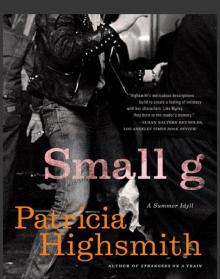 Small G: A Summer Idyll
Small G: A Summer Idyll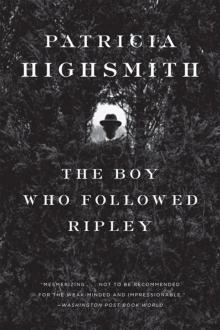 The Boy Who Followed Ripley
The Boy Who Followed Ripley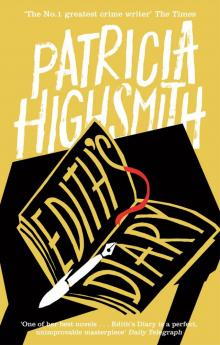 Edith's Diary
Edith's Diary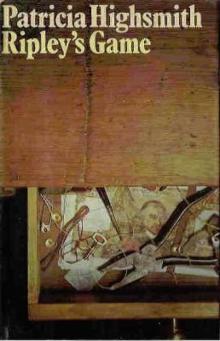 Ripley's Game
Ripley's Game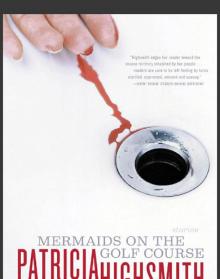 Mermaids on the Golf Course: Stories
Mermaids on the Golf Course: Stories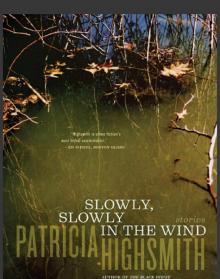 Slowly, Slowly in the Wind
Slowly, Slowly in the Wind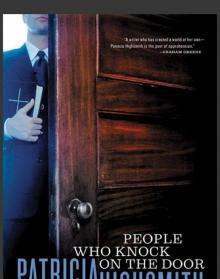 People Who Knock on the Door
People Who Knock on the Door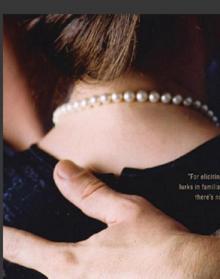 The Glass Cell
The Glass Cell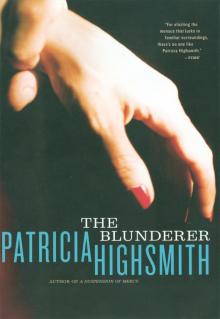 The Blunderer
The Blunderer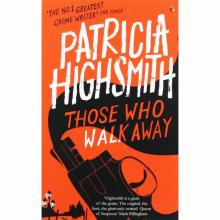 Those Who Walk Away
Those Who Walk Away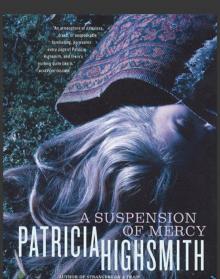 A Suspension of Mercy
A Suspension of Mercy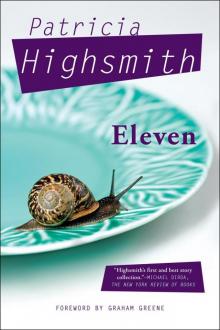 Eleven
Eleven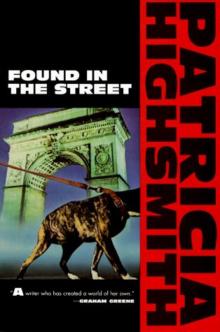 Found in the Street
Found in the Street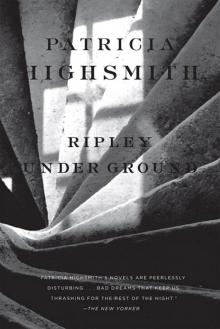 Ripley Under Ground
Ripley Under Ground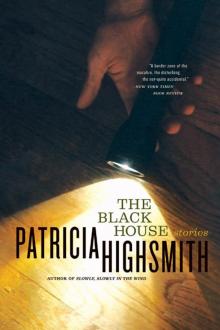 The Black House
The Black House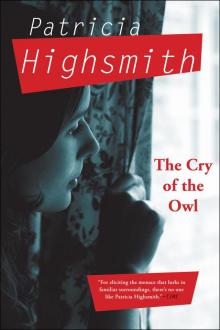 The Cry of the Owl
The Cry of the Owl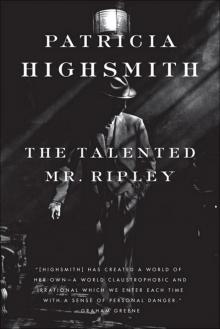 The Talented Mr. Ripley
The Talented Mr. Ripley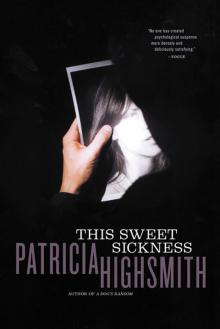 This Sweet Sickness
This Sweet Sickness The Two Faces of January
The Two Faces of January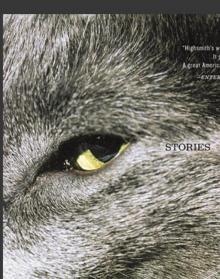 The Animal-Lover's Book of Beastly Murder
The Animal-Lover's Book of Beastly Murder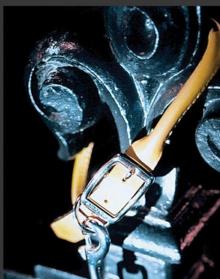 A Dog's Ransom
A Dog's Ransom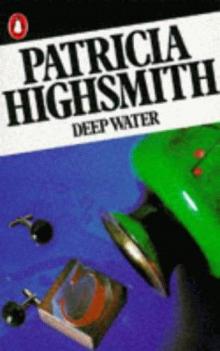 Deep Water
Deep Water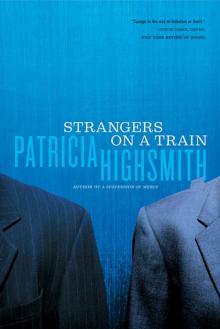 Strangers on a Train
Strangers on a Train Ripley Under Water
Ripley Under Water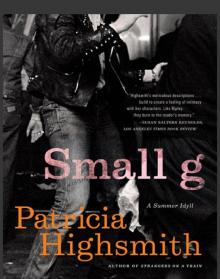 Small g
Small g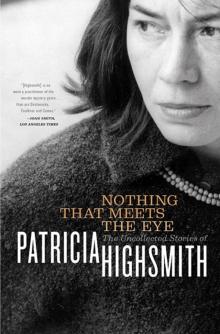 Nothing That Meets the Eye
Nothing That Meets the Eye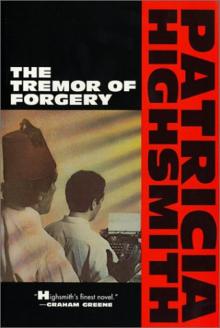 Patricia Highsmith - The Tremor of Forgery
Patricia Highsmith - The Tremor of Forgery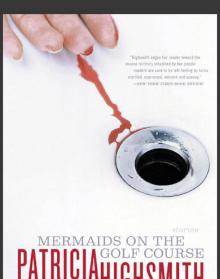 Mermaids on the Golf Course
Mermaids on the Golf Course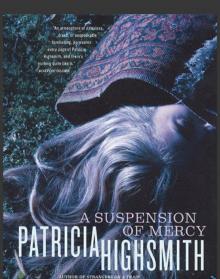 Suspension of Mercy
Suspension of Mercy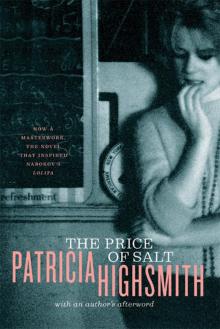 The Price of Salt, or Carol
The Price of Salt, or Carol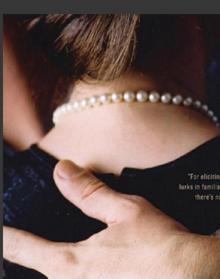 Glass Cell
Glass Cell